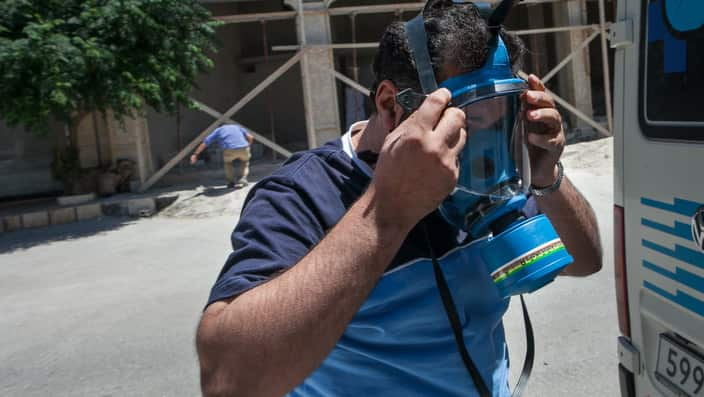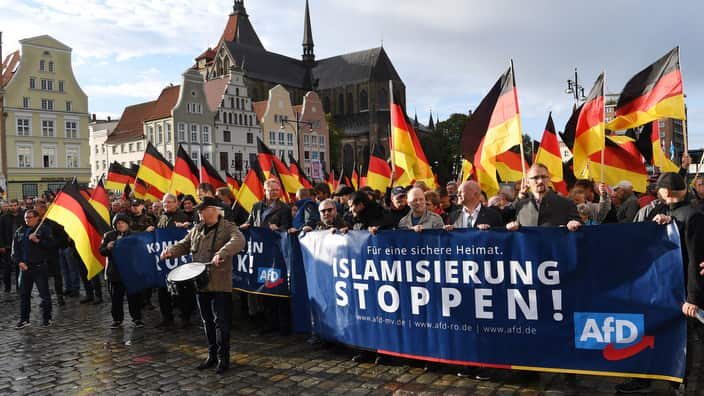Kassem Eid survived the 2013 chemical weapons attack in Syria. This near-death experience and his participation in the revolution against Assad’s regime have turned him into a fighter for human rights. He tells his story in his book ‘My Country: A Syrian Memoir’.
Eid first wrote his memoir as a form of personal therapy.
After surviving war in Syria and then fleeing to the US and Germany, he had felt an overwhelming sense of guilt. Good friends and a lot of good people he knew were killed because they didn’t have the chance or privilege of safety like he had.
As such, Eid feels obliged to speak for them and to continue their fight. He also wants people to learn about the cruelty and brutality of war and most of all, the truth about what happened in Syria and what truly triggered the revolution. He now sees his book as a strategic tool in a war against Assad’s regime, against the lies and propaganda he says are spread by those with interests in the conflict.
He now sees his book as a strategic tool in a war against Assad’s regime, against the lies and propaganda he says are spread by those with interests in the conflict.

Ambulance driver puts on gas mask after reports of chemicals attacks during clashes in province of Idlib, June 21, 2013. DANIEL LEAL-OLIVAS/AFP/Getty Images) Source: AFP
“In Syria we suffered from this propaganda for a long time,” Eid tells SBS German. “If people don’t stand against it, in the end it becomes normal to keep hearing lies about war criminals who have committed genocide, who were gassing civilians, raping women, torturing people to death, killing more than a million people and displacing have of the citizens.”
Eid sees himself as a completely different person after his experience of Syria’s civil war. He says he never thought he would wake up one day to see his own government bombing its citizens with airplanes, tanks and chemical weapons.
He is frustrated by the international community which he says publicly vaunts high principles of freedom, democracy and human rights, but has not pursued their importance in Syria.
After all, he never thought he would one day pick up a gun and fight his government.
“In this unbelievable reality that I found myself facing I had to somehow adapt and change,” he says of his decision to fight in the war. “I had to somehow find the strength inside me to keep going because I watch a lot of brave people surrender to despair. Someone has to stand up for others.”
Eid concedes that his country needs a “miracle” for the now nine-year conflict to end. He has been lobbying the US Government, EU and UN to stop the war crimes in Syria to little avail. He himself does not have an immediate solution at hand either. The Middle East is a complicated place, he says, citing European interference in the region as a wellspring of problems.
“All problems in the Middle East started almost one hundred years ago when a French and a British diplomat decided to get drunk and start drawing borders on the map after the Ottoman empire was defeated.”
Two years after Eid fled to America he left for Germany to join his siblings in Magdeburg, a small town in Sachsen-Anhalt.
He says he feels welcomed by the German people and the government but at the same time sees a lot of racism, especially since right-wing party Alternative for Germany (AfD) plays a vital role in parliament.
Eid believes that there is a systematic effort by the AfD to make the life of refugees in Germany as hard as possible.
“The Nazis are back,” he says of the party. “It’s as simple as that. They just rebranded themselves. The only difference is that the Nazis in the 30s blamed everything on the Jews. Today they are blaming everything on the Muslims.” Eid says he was touched by the kindness of Australians during his book tour here. Yet he did get the impression that many Australians see refugees only as potential IS-terrorists or people who are trying to invade their country and steal their jobs.
Eid says he was touched by the kindness of Australians during his book tour here. Yet he did get the impression that many Australians see refugees only as potential IS-terrorists or people who are trying to invade their country and steal their jobs.

An AfD taking place, with a poster stating, "Stop Islamization!" Ralf Hirschberger/picture alliance via Getty Images Source: picture alliance
In Eid’s eyes such a fearful view is motivated by propaganda similar to what he saw in Syria, put forward by forces he says sow hate and division to gain power. Eid says he hopes Australians will look beyond simplistic explanations and understand that refugees actually do love life more than anyone else.
“Why else would they risk drowning or being shot at while trying to find a better place to live?,” he asks.
“I hope Australians are voting for people who are willing to accept and help others and do not vote for people who want to isolate them and turn Australia into a police state or similar.”
